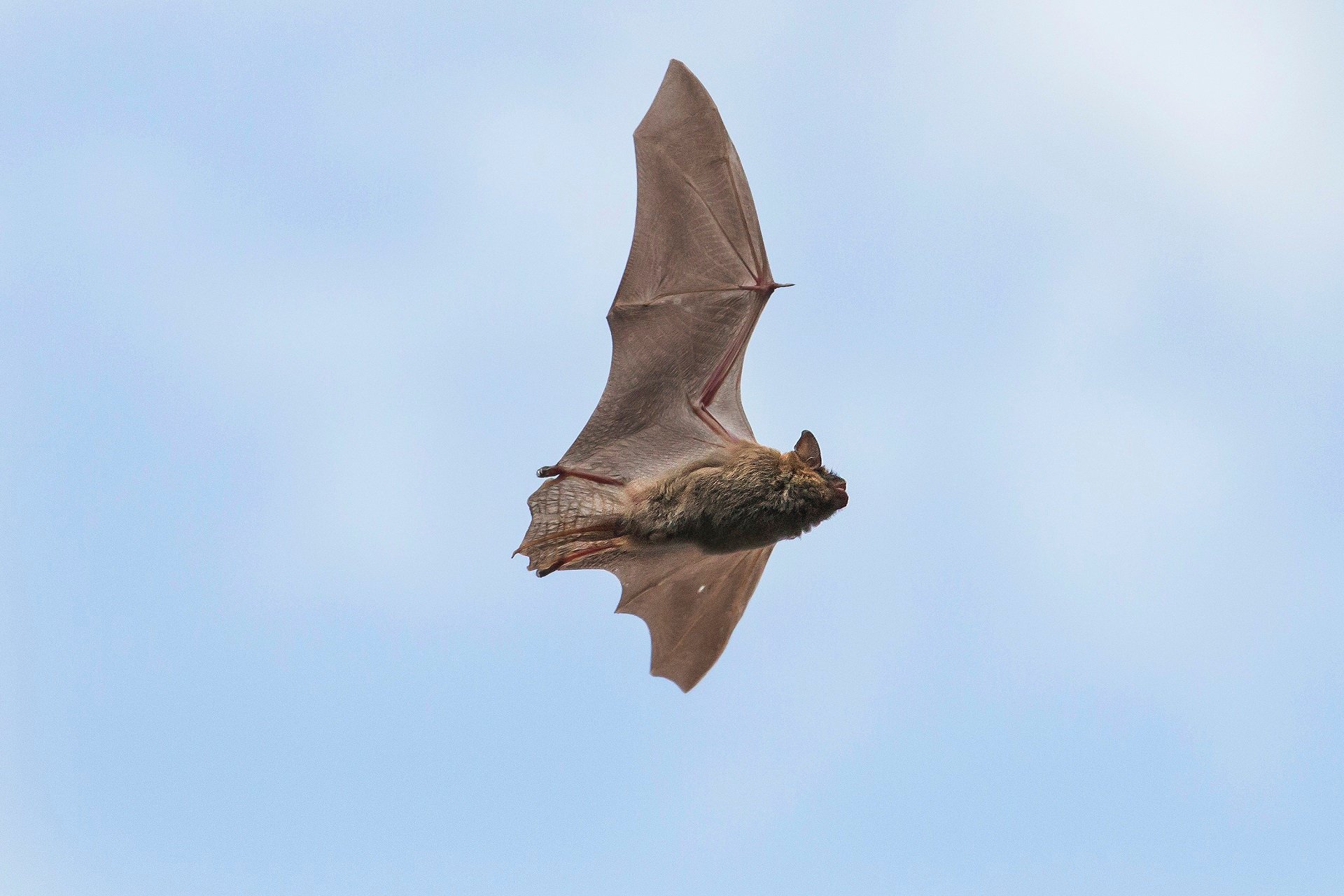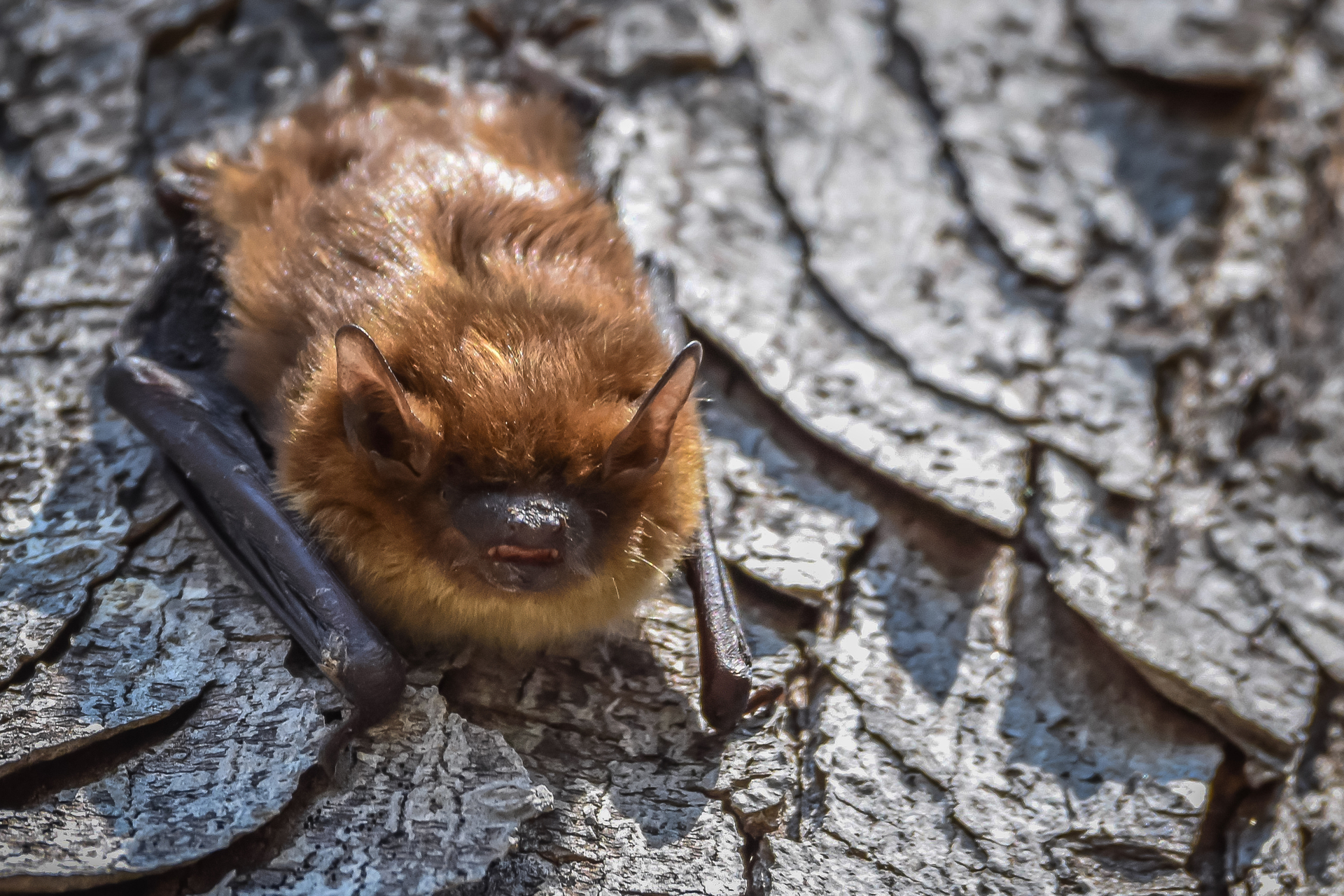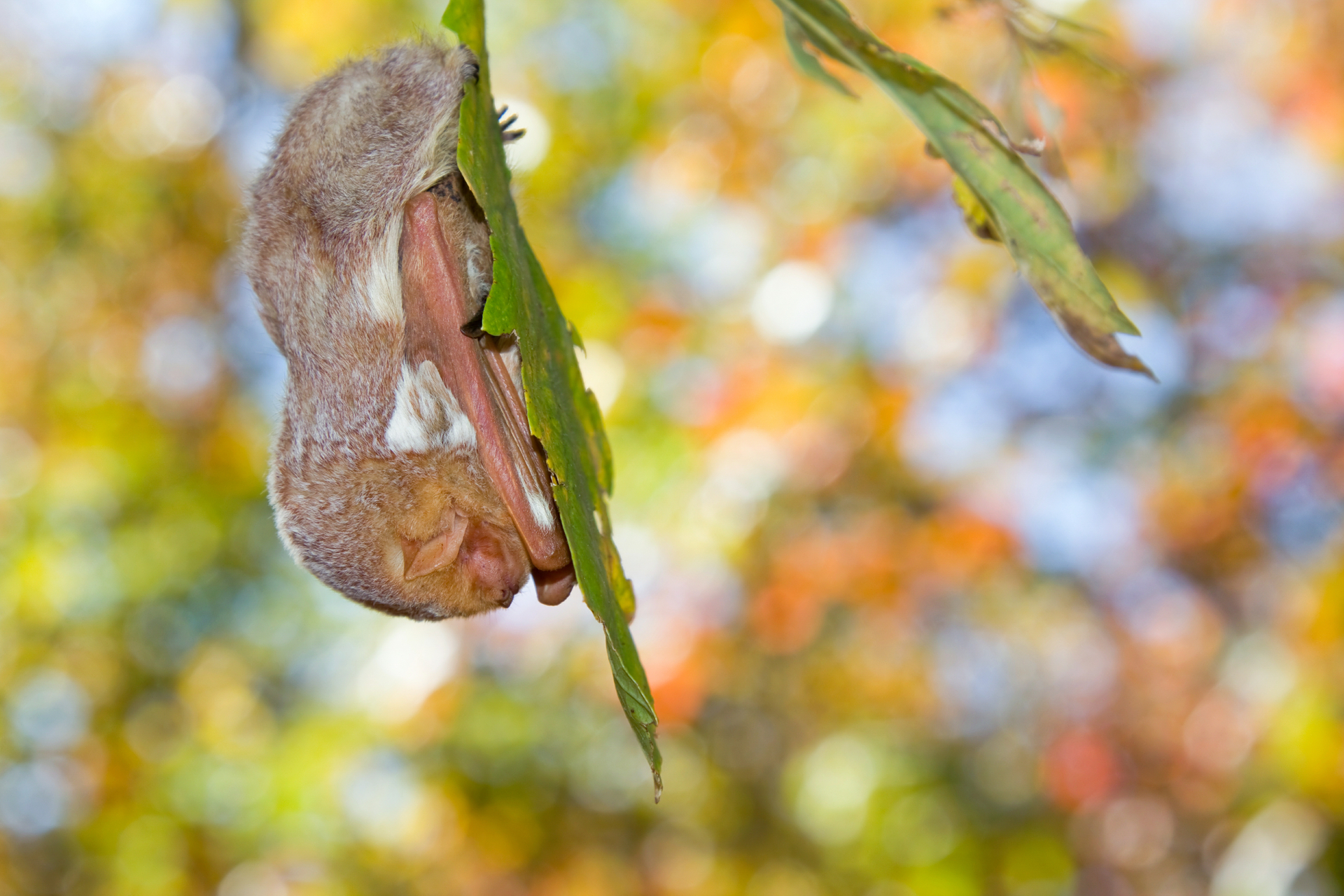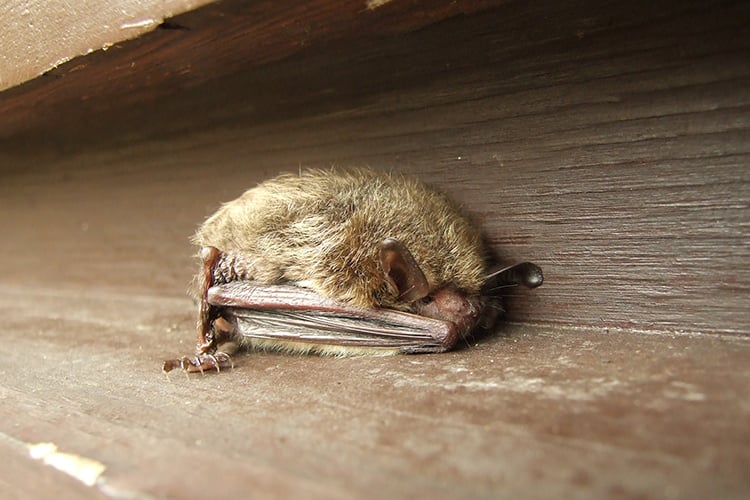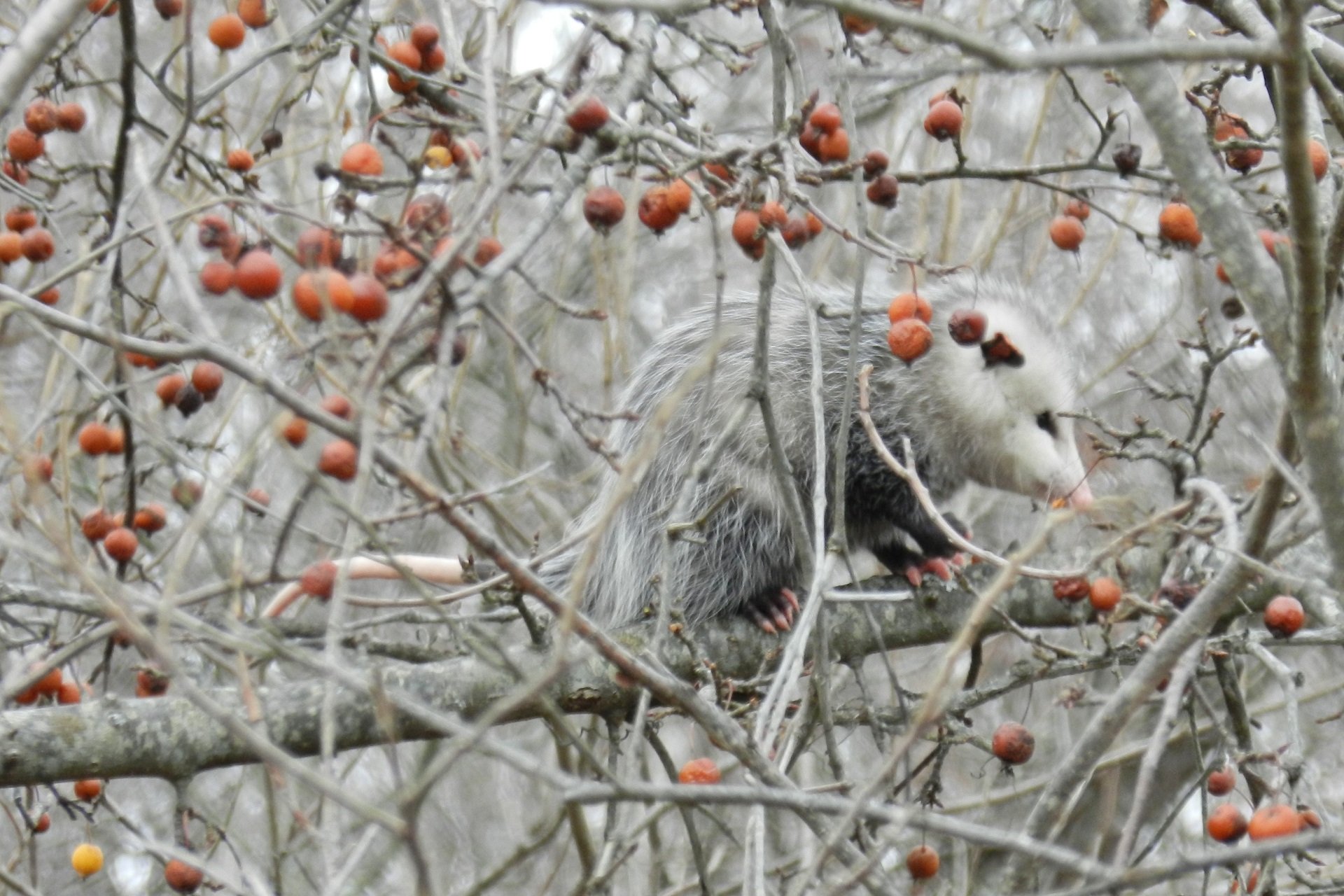Mammals in Massachusetts
Bats in Massachusetts
Bats are incredibly cool animals and play a really important role in nature. All bats are mammals and the ones found in Massachusetts are insectivores, meaning they only eat insects like mosquitoes and moths. It is estimated that an individual bat can eat 600 insects per hour.
Bats belong to the order Chiroptera, which means "hand-wing." Their wings are composed of two thin layers of skin or membrane, attached to elongated finger bones. Each membrane has four fingers and a thumb, which control the wing's movement. The thumb, located at the top of the wing, acts as a hook with which the bat can crawl on flat surfaces.
Types of Bats in Massachusetts
Nine species of bats have historically lived in Massachusetts, several of which are state listed as Endangered.
Two common bats found in Massachusetts are the Little Brown Bat (Myotis lucifugus) and the Big Brown Bat (Eptesicus fuscus). Both have short, soft fur covering their head and body and rich brown bodies with slightly darker brown wings.
Eastern Red Bat (Lasiurus borealis)
Usually solitary, the Eastern Red Bat roosts in trees, hanging from one foot and swaying slightly to resemble a dead leaf. The female gives birth to an average of three young in early summer. In autumn the Eastern Red Bat migrates along the east coast using the same routes as many birds. Little is known about its migratory destinations.
Hoary Bat (Lasiurus cinereus)
The largest bat found in Massachusetts is also seldom-seen. The Hoary Bat has striking fur with a frosted appearance. During the day it roosts alone in the dense foliage of a tree, preferably a conifer. It generally avoids human structures.
The Hoary Bat also has the most extensive range of any North American bat: it’s found from Canada to Chile and Argentina. Northern populations often move to southern states where it is warm enough to roost in the open.
Little Brown Bat (Myotis lucifugus)
The Little Brown Bat was once the most common bat species in Massachusetts, but the white-nose syndrome epidemic in its wintering caves has dramatically reduced its population. Its body measures 3.1 to 3.7 inches long, including the tail, and has an 8.5 to 10.5-inch wingspan. Status: Endangered in Massachusetts.
Big Brown Bat (Eptesicus fuscus)
The Big Brown Bat has a glossy exterior and range from 4.3 to 5.1 in length with a 12 to 13-inch wingspan. In summer, it lives in buildings and trees. In the winter, it may hibernate in a cave, but typically inhabits a dry area such as an attic where the white-nose fungus cannot survive. This abundant species hunts for insects in a wide variety of habitats and is most often seen as they are most likely to roost in human structures.
Tricolored Bat (Perimyotis subflavus)
Formerly called the Eastern Pipistrelle, the Tricolored Bat is named for its fur color: each hair is dark at the base, light in the center, and dark at the tip. This bat hibernates in caves and mines, where the white-nose fungus thrives. Status: Endangered in Massachusetts
Silver-haired Bat (Lasionycteris noctivagans)
The Silver-haired Bat has dark brown fur with silver tips on the backside. They are typically about 3.9 inches in length and weigh about 10.5 grams. Silver-haired Bats can only be found in Massachusetts during the summer and migrations and do not breed here. They can be found in forests alongside bodies of water.
Eastern Small-footed Bat (Myotis leibii)
As one of the smallest bats in the area, the Eastern Small-footed Bat is only 1.2 to 31.4 in long. Their fur has a golden hue, and their face and ears are black. They are considered rare in Massachusetts.
Northern Long-eared Bat (Myotis septentrionalis)
Long-eared Bats are easily recognized by their long ears—which can even reach past its nose! These bats were once a common species across the state but have suffered massive population drops due to White-nose Syndrome. Status: Endangered in Massachusetts
Bat Life Cycle
Bats mate in the fall before hibernation and the sperm is then stored in the female's uterus throughout the winter. The eggs become fertilized when hibernation ends in the spring and in June or early July, the females gather into large "nursery colonies" and roost in dark, hot places such as attics, barns, and other outbuildings to give birth and raise their young.
The gestation period for both the Little Brown and the Big Brown bats is 50 to 60 days. Little Brown Bats give birth to one offspring and Big Brown Bats deliver one or two. As soon as the baby is born it clings to its mother, attaching itself to a nipple and, for the first few days, is carried by her when she flies at night searching for food.
At three or four weeks the young begin to take short flights and catch their own food. When the young are able to feed themselves the "nursery colony" disbands to begin preparing for hibernation.
Meanwhile, males, often solitary or in groups of less than a dozen in the summer, roost in cooler spots behind window shutters, awnings, and under the bark of trees. Bats rest in these protected roost sites during the day leaving at sunset to search for food.
Bat Hibernation
When nursery colonies break up in late summer, Little Brown Bats migrate to hibernation caves and mines, mainly in western Massachusetts, upstate New York, and Vermont. Big Brown Bats, which are more tolerant of cold temperatures, may migrate to caves or spend the winter in the same buildings they occupy the rest of the year.
Bats choose a location to hibernate with temperatures between 30 and 40-degrees Fahrenheit. If the temperatures drop below freezing they will move to a location with more favorable temperatures. As hibernation begins, bats exhibit "torpor" where body temp and metabolism slow, helping them to conserve energy. They can enter a torpid state for a few hours to conserve energy on a cold day when food is scarce or for the entirety of their hibernation period. They can slow their heart rate during hibernation from 200-300 beats per minute to 10 beats per minute, and their body temperature drops until it is only slightly higher than the air surrounding it.
How Do Bats See and Hear?
Bats are not blind; in fact, they have excellent eyesight–but when it comes to hunting, bats don’t rely on their eyes. They use echolocation to detect the location, size, and shape of objects—even as minute as human hair. When in flight they continuously emit high-frequency sounds (unheard by humans), which echo back to their ears enabling them to locate objects, like the flying insects they feed on.
A bat uses the increasing frequency of the echoes to zero in on its target. During its search for food, a bat may emit 10-20 pulses per second, increasing to 500 per second just before it attacks its prey.
Are Bats Dangerous?
The bat species in Massachusetts aren’t generally dangerous as they eat fruit or insects, which not only means they won't attack humans, but that their teeth are too small to cause severe damage. However, they can carry zoonotic diseases, such as rabies.
What To Do About Bats in Homes
A distinctive ammonia smell in the house or attic and stains and dark brown, oval droppings on the outside walls of the house may indicate you have a bat taking up residence. At first glance, dropping looks similar to rat scat, but it can glint due to undigested insect wings.
Bats may enter areas occupied by people through an open window or door, or an opening from a colonized attic or wall. They can even sneak in via a hole as small a 1/2 inch.
It may be a young bat who tried to follow its mother outside and took a wrong turn or it may have followed a moth through an open window. If it’s not just a lost bat, there could be another reason for your new tenant—bats could make their way indoors for warmth, perceived safety, or following prey.
How to Remove a Bat From Your Home
If a single bat is in your house, confine the bat to one room by closing doors and blocking the space under doors with a towel. Open windows, turn off the lights, and leave the room. Do not hit or throw things at a bat; this will only cause it to become disoriented, making it harder for the bat to find its way out.
If a bat doesn’t exit on its own, you can try to throw a towel or large blanket over it, scoop it up, and bring it outside.
If a bat is found in a bedroom with a sleeping person, you will want to alert local health officials or the Massachusetts Department of Public Health.
How to Bat-Proof Your Home
We encourage hospitality towards bats, however, if there is a substantial reason to exclude them from your attic, actions should be undertaken only during May and from mid-August to mid-October. In between those periods young bats could be blocked inside, and without access to food, would be left for dead.
If you need help bat-proofing your home, call an expert from a pest removal company or wildlife removal company.
Threats Facing Bats
Bats face a variety of threats including habitat loss, decreasing food supplies, and disease. The most concerning disease is white-nose syndrome.
White-nose Syndrome
White-nose syndrome affects bats that hibernate in caves and mines. Named for an aggressive white fungus that irritates bat skin and increases their metabolism, which reduces their stored fat reserves and leads to starvation, the disease spreads rapidly and has a very high mortality rate.
More than a million of these mammals have died in the Northeast and Canada, and some sites where bats hibernate, have witnessed a 90-100% decimation in their population. Spreading of White-nose Syndrome occurs during the winter, which is why reserves are so important for bat populations.
How Mass Audubon Helps Bats
Bats play a critical role in our ecosystem, including pollination. Mass Audubon is advocating to protect all pollinators, including bats, through state legislation. You can also help us conserve and protect bats by becoming a member today.
Stay Connected
Don't miss a beat on all the ways you can get outdoors, celebrate nature, and get involved.



